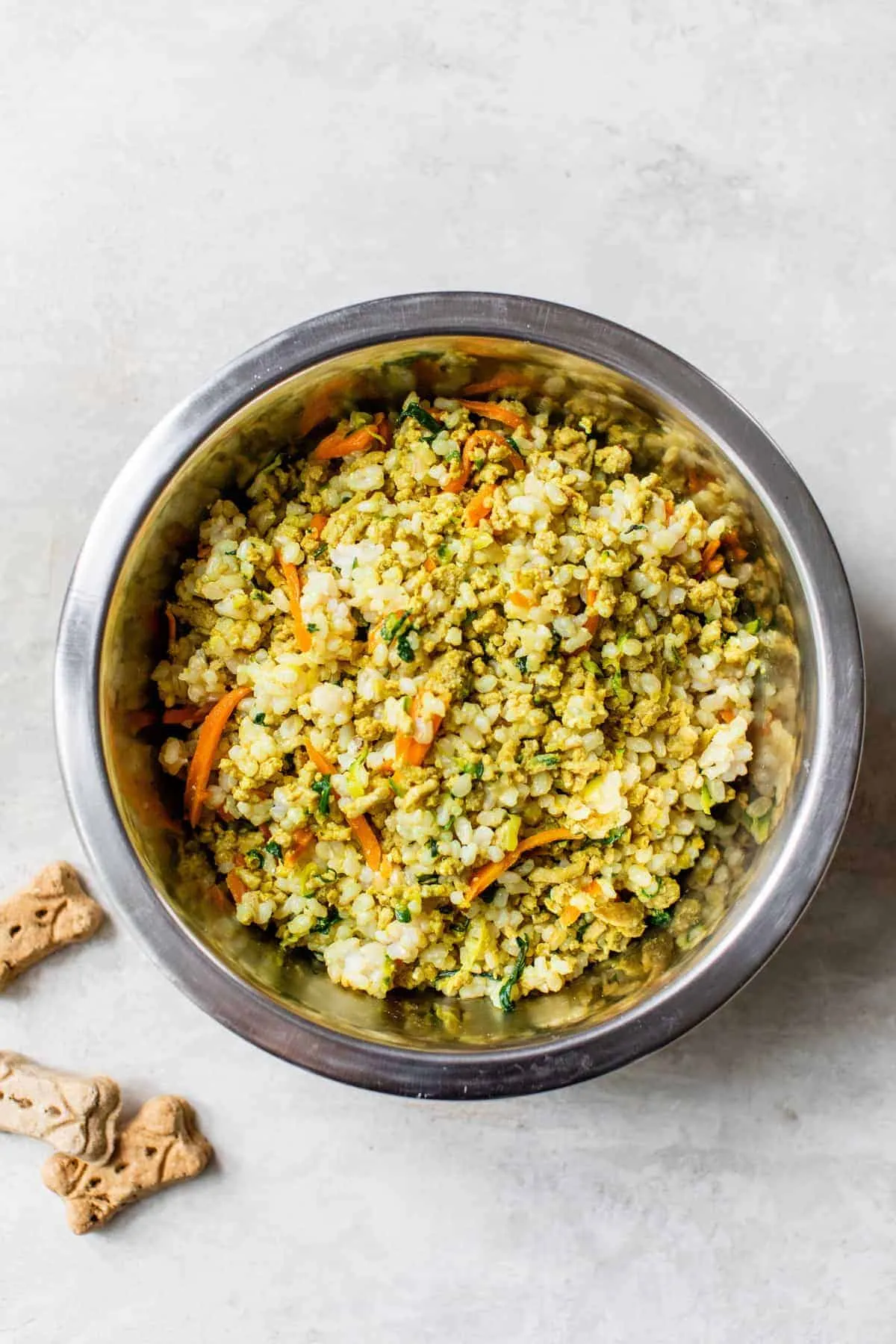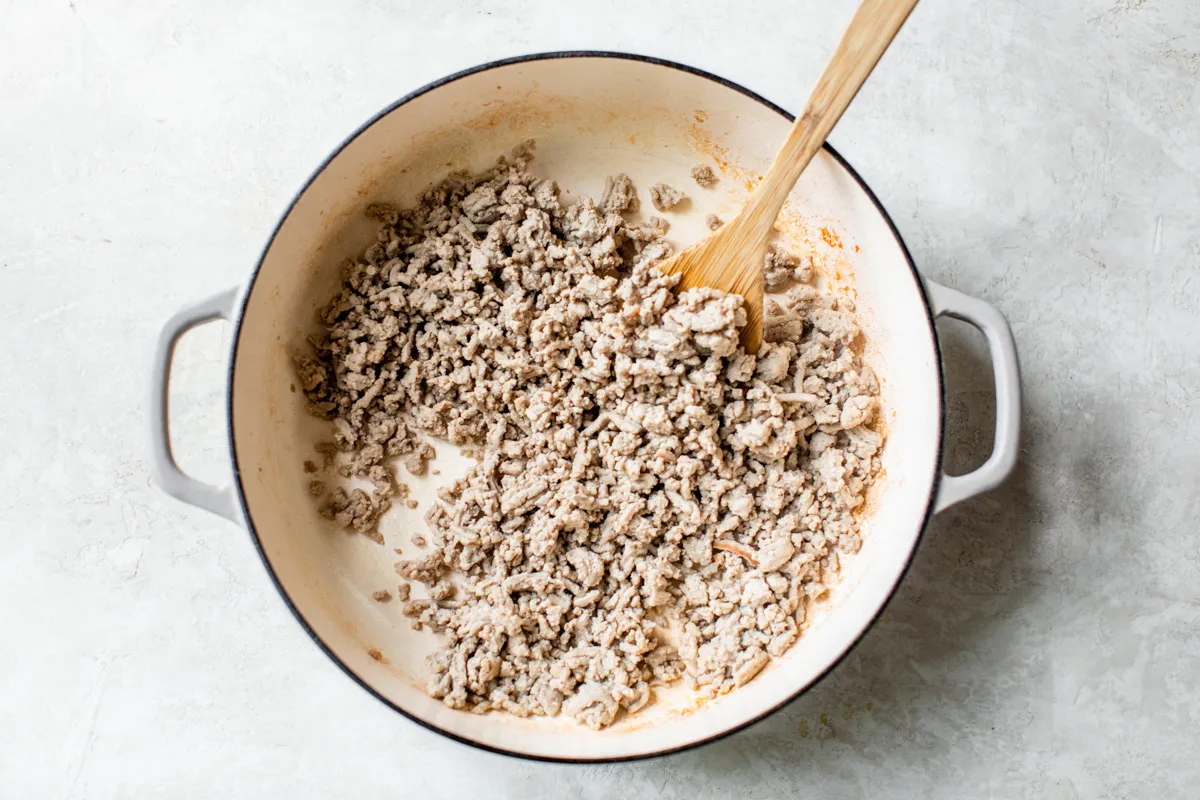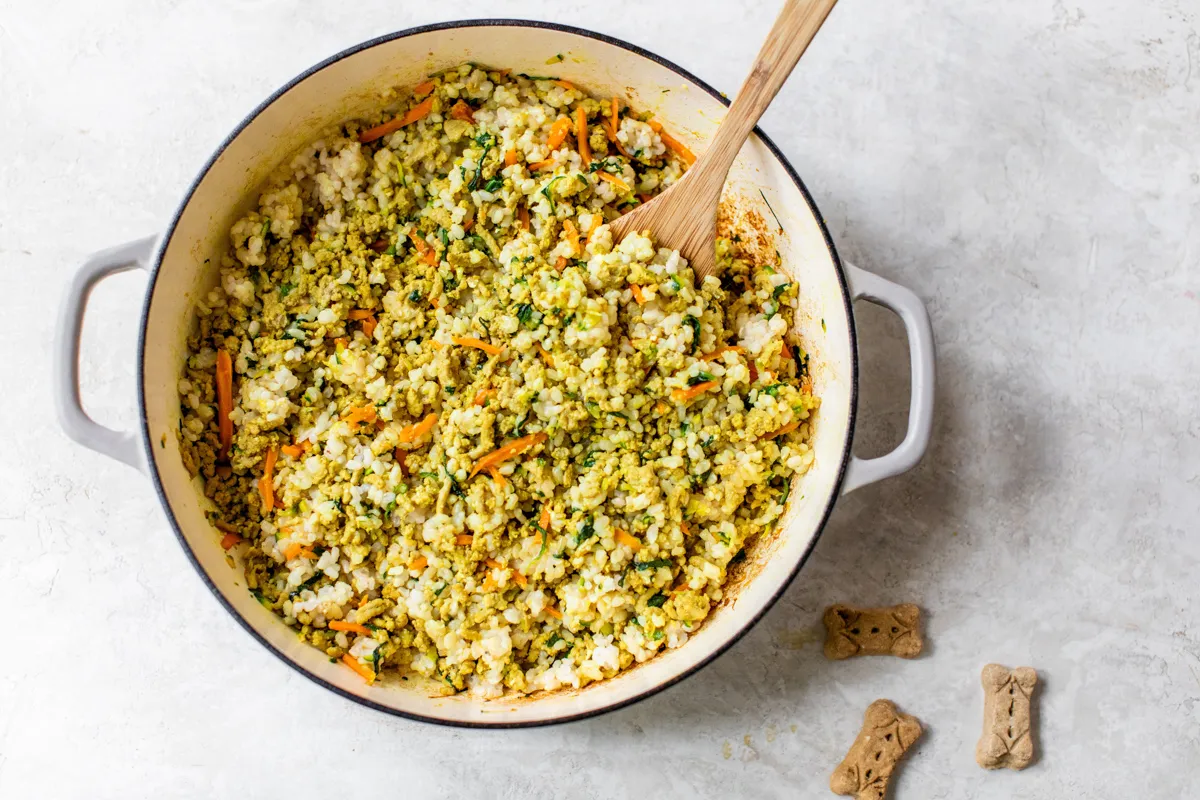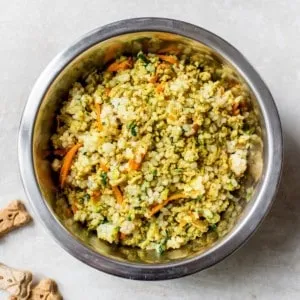Giving your small dog the best nutrition possible is a top priority for any dedicated pet parent. While commercial options abound, there’s a growing trend towards creating healthy, Homemade Dog Food For Small Dogs right in your own kitchen. Imagine knowing exactly what goes into your tiny companion’s bowl – real, whole ingredients that are easy to find and prepare. This guide will show you how to whip up a balanced, delicious meal on your stovetop in just 30 minutes, perfectly tailored for your small breed.
Our four-legged family members deserve the same care and consideration we give ourselves. If the rest of the family enjoys nutritious, home-cooked meals, why shouldn’t your small dog? The key to successful homemade dog food for small dogs is simplicity and balance. Like humans, dogs need essential nutrients: protein, healthy fats, complex carbohydrates, vitamins, and minerals. The American Kennel Club (AKC) and the Association of American Feed Control Officials (AAFCO) provide guidelines that form the bedrock of a healthy canine diet, ensuring your small pup gets everything they need.
This particular recipe is an excellent starting point. It features lean ground turkey, a medley of vegetables, and brown rice – a nutrient-dense, protein-rich combination that’s simple to prepare and loved by even the pickiest small pups. Whether you’re looking to fully transition your small dog’s diet or simply add a nutritious boost, making your own food can be incredibly rewarding. If you’re exploring options for your dog’s diet, our comprehensive article on dog food recipes for small dogs offers more tailored ideas.
 Homemade dog food in a small bowl, perfect for small dogs, with healthy treats nearby.
Homemade dog food in a small bowl, perfect for small dogs, with healthy treats nearby.
Why Homemade Food is Ideal for Small Breeds
Small dogs often have unique dietary needs. They can be prone to dental issues, sensitive stomachs, and specific metabolic rates. Homemade food offers several advantages:
- Controlled Ingredients: You choose every component, avoiding fillers, artificial preservatives, and common allergens that might upset a small dog’s sensitive system. This is especially beneficial if your dog has allergies or sensitivities.
- Portion Precision: Small dogs require very specific portion control to maintain a healthy weight. Homemade meals allow you to precisely measure caloric intake, preventing obesity, which can be a significant health concern for smaller breeds.
- Freshness and Digestibility: Fresh, whole ingredients are often easier for small digestive systems to process compared to highly processed commercial foods.
- Hydration: Homemade food often has a higher moisture content than dry kibble, contributing to better hydration and kidney health.
It’s important to remember that while homemade food offers many benefits, it must be nutritionally complete. Always consult your veterinarian before making significant changes to your small dog’s diet to ensure all their specific needs are met. For owners considering a mix of homemade and commercial options, understanding the best kibble for dogs can help you make informed choices.
Key Ingredients: The What and The Why for Small Dogs
When crafting homemade dog food for small dogs, aim for simplicity, balance, and real, wholesome ingredients. This recipe prioritizes lean protein, nutrient-rich vegetables, and healthy grains, all essential for your small companion’s vitality.
Every dog is unique, so it’s always wise to consult your vet before implementing any major dietary changes, especially for small breeds with specific health concerns.
- Ground Turkey: An excellent lean, high-quality protein source crucial for maintaining muscle mass and providing sustained energy for your energetic small dog. While other proteins like ground beef, bison, salmon, or chicken are options, turkey is often well-tolerated and digestible.
- Veggies (Zucchini, Spinach, Carrots): Small dogs need their vitamins and fiber too! These vegetables provide essential nutrients, antioxidants, and dietary fiber, aiding digestion. Always ensure you select dog-safe options. Be cautious, as some common human foods can be toxic to dogs; this helpful resource outlines what meat you should not feed your dog and other forbidden foods.
- Egg: Eggs are a fantastic nutritional booster, easy on the stomach, and highly digestible. They’re packed with essential vitamins like D and B12, providing a gentle protein source that’s convenient to add.
- Rice (Brown or White): Rice helps bind the ingredients, making the meal more cohesive and filling. Brown rice offers more fiber and nutrients, which can be great for active small dogs. White rice, being simpler, is often easier for sensitive small stomachs to digest.
- Coconut Oil: A small amount of coconut oil adds healthy fats that can promote a shiny coat, healthy skin, and good digestion. Its light, naturally sweet, and nutty flavor is often appealing to dogs.
- Turmeric (Optional): Just a pinch of turmeric can offer natural anti-inflammatory benefits due to its curcumin content. This can support joint health and boost the immune system, particularly beneficial for older small dogs or those with minor aches. Start with a very small amount and mix thoroughly.
Disclaimer: I am a passionate dog owner sharing my experience, not a veterinarian. Every dog has unique nutritional requirements based on age, size, activity level, and breed-specific needs. This recipe is designed to complement your small dog’s diet, not fully replace it, without professional veterinary guidance. It is imperative to consult your veterinarian before making any significant dietary adjustments to ensure your small pup receives a complete and balanced diet for their optimal health and happiness.
How to Prepare Homemade Dog Food for Small Dogs
Before you start cooking, the single most important step is to consult your veterinarian! Your vet can help assess your small dog’s specific nutritional and caloric needs and confirm that this recipe, or any homemade diet, is safe, balanced, and appropriate for your beloved companion.
 Ground turkey browning in a large pot, a foundational protein for homemade dog food.
Ground turkey browning in a large pot, a foundational protein for homemade dog food.
Step-by-Step Instructions:
- Sauté the Turkey: Heat 1 tablespoon of coconut oil in a large skillet or pot over medium-high heat. Add 1 pound of ground turkey and sauté until it is thoroughly browned and cooked through, which usually takes about 10 minutes. Break up the turkey as it cooks.
- Add Veggies & Spices: Reduce the heat to medium. Stir in 1 large shredded zucchini, 1 cup of finely chopped baby spinach, 1 cup of shredded carrots, and 1/2 teaspoon of turmeric (if using). Cook, stirring occasionally, for 5-7 minutes, until the vegetables are tender.
- Incorporate Egg: Turn off the heat. Crack 1 egg into the hot food and mix it in immediately. The residual heat from the food will gently cook the egg as you stir, binding the ingredients together.
- Stir in Rice: Add 3 cups of cooked rice (brown or white, preferably frozen brown rice for convenience) and stir until everything is well combined.
- Cool and Serve: Allow the mixture to cool completely before serving it to your small dog.
 Mixing cooked vegetables and egg into homemade dog food ingredients.
Mixing cooked vegetables and egg into homemade dog food ingredients.
Recommended Serving Size and Storage for Small Dogs
Determining the exact amount of homemade dog food for small dogs depends heavily on their individual weight, age, activity level, and metabolic rate. Given the variability, it is always best to seek personalized guidance from your veterinarian. They can help calculate precise caloric needs.
As a general guideline at home, monitor your small dog closely. Ensure they are maintaining a healthy weight – you should be able to feel their ribs without seeing them prominently, and they should have a discernible waist. Observe their energy levels and overall demeanor. They should be enthusiastic about mealtime and active throughout the day.
This recipe yields approximately six cups of food. For a small dog, this amount will last significantly longer than it would for a medium-sized dog. You can easily adjust the batch size by scaling the ingredients up or down based on your small dog’s needs. Doubling or tripling the batch allows for less frequent cooking, which can be a real time-saver.
Storage Tips:
- Refrigerator: Once cooled, store the homemade dog food in an airtight container in the fridge for up to 5 days.
- Freezer: For longer storage, portion the food into freezer-safe containers or bags. It can be frozen for up to 6 months. Thaw individual portions in the refrigerator overnight before serving.
Our small companions absolutely adore their freshly prepared meals. The joy of seeing them thrive on nutritious, homemade food is immense!
 Freshly prepared homemade dog food served in a stainless steel bowl for a small dog.
Freshly prepared homemade dog food served in a stainless steel bowl for a small dog.
Conclusion
Making homemade dog food for small dogs is a fulfilling way to ensure your furry friend receives a diet tailored to their specific needs. This 30-minute stovetop recipe provides a wholesome, balanced, and delicious meal packed with essential nutrients. Remember, the journey to a healthy diet for your small pup begins with fresh ingredients and, most importantly, a conversation with your veterinarian. Their expert advice is invaluable in ensuring your homemade creations are nutritionally complete and perfectly suited for your beloved companion. Empower yourself with the knowledge to nourish your small dog from your own kitchen, leading to a happier, healthier life together.
